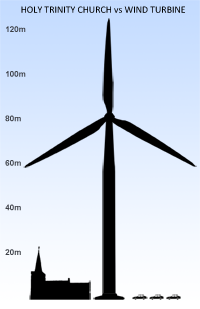- Home
- Proposals
- The Arguments
- About Us
- News
- BBC bias on climate change
- Latest News
- Climate change balance lost by BBC
- Energy Prices-The Times
- Turbines trash landscape benefit billionaires
- Global Warming Panic Over!
- Mini-Nukes the future
- The dirty secret of Britain's power madness
- Extreme weather the new Global Warming
- Tax Payers Alliance Energy view
- Britain can't afford wind power
- Fracking = prosperity?
- Its time to drill- Times leader
- Thoughtful article on Fracking
- Wind double subsidised
- Deluded energy policy
- The EU U-turn over energy
- Windfarm Wars Company in Churchover
- New noise guidance increases risk of harm
- Peter Lilley MP, Delingpole's new hero
- Shale Gas update 2013
- Maggie U-turned on Global Warming
- Devastatingly sad news
- 'smart' energy technology
- Engineers surveyed 2011
- Lord Turnbull speaks out
- Miracle shale gas
- Planning application refused!
- Warwickshire heritage beauty spot protected!
- Press
- Articles
- Letters
- How To Help
- Donations
- Letters of Objection
- New Churchover PC Objection
- New Historic England Objection
- Churchover Resident Objection
- CPRE Objection
- English Heritage Objection
- Objection by expert R&F historian
- Leicestershire County Council objection
- Warwicks CC Ecology objection
- Harborough District Objection
- Churchover PC Objection
- Bitteswell PC Objection
- Pailton PC objection
- Some other Objections sent
- Rugby BC Planning Committee
- Contact Us
Get rich quick by being 'green'
Terence Blacker of 'The Independant' analyses why there are fewer windfarm applications being accepted than a few years ago.
Terence Blacker: Get rich quick by being 'green'
THE INDEPENDENT - Tuesday, 12 July 2011
Having recently contributed to a public inquiry into a proposed wind turbine development, I have taken a particular interest in the news that planning applications of this kind are less likely to be granted than in the past.
As usual, the story has been presented in terms of selfish locals acting against the greater environmental good and, as usual, one crucial element of the renewables story has been entirely ignored. Wind farms are, thanks to the system of public subsidies, highly profitable. The great cause of green energy may impinge on the lives of those who live near to them, but the pain is not exactly shared by developers, landowners and those who act for them. This new report, expressing "growing concerns that developers are being denied a fair hearing", has been issued by the law firm McGrigors, which happens to specialise in the area.
Significantly, developers tend to be reluctant to reveal their figures but, according to the authoritative Renewable Energy Foundation, one 400ft turbine is likely to generate £660,000 a year in income. During its 25-year life, a single turbine would bring in £16.5m.
Landowners will get a healthy share of the action, too. So tempting are the rewards of a successful application that energy companies have taken to cold-calling farmers, offering eye-watering sums. One farmer in Northumberland received 12 approaches. Another was offered £72,000 a year over a 20-year period if he agreed to four turbines being erected on his land.
Here is the first powerful reason why fewer applications from wind farms are being accepted by planning committees than in the past. Attracted by the subsidies on offer, developers are grabbing unsuitable land.
On occasions, they have admitted that they have not looked elsewhere in an area for more appropriate sites;
it was enough to have a landowner willing to sell.
Unsurprisingly, planning officers and their committees have taken an increasingly sceptical view of applications. Too often, energy companies have, as the recent BBC documentary Windfarm Wars confirmed, held back key information. They have used bullying tactics, and regularly characterise those who have raised concerns about effects on human lives, the impact on landscape and wildlife, as selfish and trivial-minded.
The McGrigors report crucially omits a second reason why applications are less likely to succeed today than two or three years ago. On this small and, compared to Spain, Germany or America, crowded island, there are comparatively few sites suitable for this kind of development – and many of those have already been taken. Every year, finding somewhere to put onshore turbines where they do not have an unacceptably harmful effect becomes more difficult.
It is one of the great hypocrisies of the moment that those who stand to make a fortune in subsidy-based profit are presented, sometimes by those who should know better, as environmental idealists working selflessly for a greener planet. On the other side, anyone who dares to question whether the benefit an individual wind farm may bring is outweighed by the harm it could cause to the countryside and those who live there, will be dismissed as a "Nimby" holding back progress for their own selfish reasons.
If the energy crisis truly requires sacrifice from individuals, it is fair to ask what contribution to the common good, rather than to their own bank balances, is being made by those developers, landowners and lawyers who will grow rich from it.
Categories:

